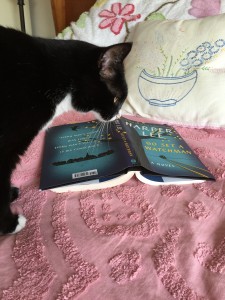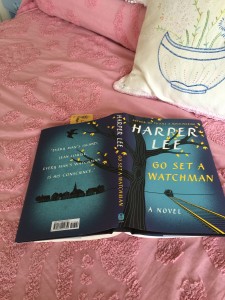I have never read To Kill a Mockingbird. This is cause for alarm among you many literate people, but you needn’t think me unlettered. In high school I read Poe, Shakespeare, JD Salinger and Carson McCullers; lots of plays, many short stories, and certainly some fat summer beach reads, too (The Thorn Birds, Jaws, Roots, Shogun and Hotel, to name a few). In college I majored in journalism and had no cause for deep American reading, and no affinity for Southern lit, but I did read Flannery O’Connor and William Faulkner. I went on to study early 20th-century British literature for my master’s degree, and drank my fill of Woolf, Joyce, and Orwell. I still read scads of early and mid-century Brit lit. It’s my crack. But I didn’t have Harper Lee on my radar for pleasure reading until now.
I’ll add a caveat to my preamble that I realize there is an issue with the release of Lee’s first draft/second book. I have read her biography and understand the nature of her friendship with Truman Capote, her anxiety about meeting people and the “sophomore slump” that often hits young, successful authors who feel unequal to producing as fine a work again. I also recognize that there are claims of elder abuse and mixed opinions about the role of Lee’s sister as protector or as censor. History will judge those who abused Lee’s trust, I’m sure.
With all that in mind, I set out to read Go Set a Watchman before reading TKAM, in hopes of seeing which felt the more true. GSAW was written first, as the earlier draft of TKAM, so they say, but her agent and editor did not think it would sell. Lee rewrote the story from the young Scout’s viewpoint and had a bestseller on her hands. She eventually won the Pulitzer Prize for her work. That’s pretty heady stuff.
“For thus the Lord said to me: “Go, set a watchman; let him announce what he sees.” Isaiah 21:6
It is but a quirk of fate that in the past month, there was an assassination of nine African-Americans in Charleston, SC, and the Confederate flag has at last begun to come down. The #BlackLivesMatter and #Occupy campaigns have raised the African American issue in the media — and a new generation of activists are tired of waiting for justice and equality. As well, in the past few months I have been engaged in family history research and have been grappling with my own Alabama roots and heritage of slave-owning in my DNA. White privilege? Yes. So much yes.
* * *
I opened Go Set a Watchman with virgin eyes and no idea other than generalities on what to expect. And was — riveted.
Scout as a young woman — Jean Louise — is New York City-cynical, streetwise, on vacation to Maycomb, Alabama. Her brother is dead. Her beau, childhood friend Hank, is on hand to woo her back to small-town life. Attorney Atticus Finch, whom she calls by his first name, is her father, crippled by arthritis, a longtime widower living with his pushy Southern matron sister, Alexandra. Adult Jean Louise is a sexual being, pushing the boundaries of Southern small-town mores by behaving like the child Scout; a late-night swim with her beau creates a furor. She’s also enlightened, having crossed the border into Yankee territory and lived and worked alongside a rainbow of skin-tones. She returns to find Maycomb charmingly simple, the same as always, but smaller in size and in their way of thinking. The problem isn’t that home has changed; it’s that she has changed.
The era is the 1950s and the Civil Rights movement is underway, with integration and the like on the agenda. The whites of Maycomb don’t like it, and their “citizens’ committee” looks a lot like the KKK. The N-word is thrown around with vitriol and Jean Louise is alarmed — she thinks of herself as color-blind. There is an incident whereby a white neighbor is accidentally killed by the grandson of Calpurnia, Jean Louise’s African American surrogate mother — their housekeeper as she and Jem were growing up. When Jean Louise comes face to face with a grieving Calpurnia, the young woman knows everything is different, that black and white are not the same, at least not down in Maycomb. And when she discovers her father and fiance in a citizens’ committee meeting, she realizes her whole life has been a lie.
I will say no more about the plot — too much already, perhaps. But to turn to the Atticus problem: I am familiar with the figure of righteous Atticus waving his figurative sword at prejudice and racism, despite not having read TKAM or seeing the entire movie. He shows up as a cultural touchstone in films, books, essays and news articles. The Atticus I find in GSAW is an aging man of his era; he was steeped in racism in small-town Alabama from his youth, and whatever his personal beliefs, the tint of the standard philosophy is going to seep in. I read his protests to adult Scout as plausible — he’s at the meeting to keep an eye on things. He’s in the group but not of the group. Hank is there because he wants to succeed in small town life; it would be social suicide not to participate — plausible today but frankly, reprehensible. Atticus is a character with his own moral compass who’s dragging his feet into the new era; he is less obstructionist and certainly less vocal and violent about it than his sister or the neighbors. Is he a good guy? A bad guy? He’s a racist — but they all are. What I don’t follow is Dr. Jack Finch, Scout’s uncle (Atticus’s brother), teaching a brutal lesson fraught with bizarre classical literary references, to Jean Louise on hero-worship. That final episode seems overwrought and histrionic in the extreme. Dr. Finch is the oddball in the bunch, acting as Greek chorus to show Jean Louise her errors.
What is hard to read, especially in light of current events — and as I said above, I read a lot of novels from the early 20th century, weekly, in fact; I am used to seeing non-PC expressions like “nigger in the woodpile” or “worked like a nigger” in those dated texts — what strikes me as much harder to swallow is the infantilization of the African American race as a whole by the characters, including Jean Louise, that continues today. “The Negroes down here are still in their childhood as a people…They’re [the NAACP are] trying to wreck us,” Atticus says. While Jean Louise argues for a race’s humanity, all the characters accept the belief that the Negroes have miles to go before they sleep, even as the population is being oppressed and prevented from enjoying their civil rights (no wonder they have so far to go). I see this attitude still alive in the world today; African Americans are “that way,” are “like that,” fill in the blank as you wish. They are Different from white people, and don’t know better, and have to be protected from themselves (cue talking heads nattering about black-on-black violence instead of the centuries of causes for violence in a shell-shocked community). And the stratification endures.
As a text, as fiction, Lee’s work is stellar. Jean Louise is a thoughtful character, sympathetic and well drawn. The scenes where African American characters have agency are few and far between, despite a story that purports to have their interest at heart, but what is there is sharp and very keenly felt. Calpurnia calling Jean Louise “Miss Jean” for the first time upon the girl’s menarche, or Calpurnia’s silence when Jean Louise arrives to commiserate over the tragedy, speaks volumes about the strict racial divide. Hank’s unsuitability as a mate for Jean Louise, the class division of this same society, is portrayed in the subplot. Setting, language, dialogue, plot and characters are beautifully crafted for a first novel, and I am in awe of Lee’s youthful skills.
Where the book fails for me is the denouement, the confrontation between Scout and her father. I don’t think it works. The strange tutelage of Uncle Jack feels dropped in from another planet. I have trouble following his Red Queen logic, and so does Scout, for that matter. And I certainly don’t buy the neat reconciliation that ends with Jean Louise remembering not to bump her head on anything difficult in life, like racism in her town, or her beau’s KKK connection.

I have not yet cracked the spine of TKAM. I look forward to reviewing that story, and then, comparing and contrasting the two, side by side, as an author’s oeuvre and as documents of our national racist heritage.
Your thoughts? Tell me.


Thanks for reviewing this as a piece of writing, as a novel, separate from the expectations of the Mockingbird pc people and the current political and social expectations.
This seems to answer some of my questions: You say,
“I opened Go Set a Watchman with virgin eyes and no idea other than generalities on what to expect. And was — riveted.”
Thanks, Ken.
Thanks Julia. Just the right balance between telling too much and too little, just the kind of review I like. Gave good reason for another person who’s never read TKAM to start naive with the original.
I’m looking forward to reading your follow up, post-TKAM. For me, the conflict between Atticus and Scout only makes sense that way– it’s the moment we all have, of seeing our parents turn from idols to humans.
I’m half way into the book… Riveted… Eager for more dialogue … Im tracking your observations… A timely contribution to a ‘conversation’ long delayed.
Wow, I have never known anyone who hasn’t read TKAM. Very interesting perspective on GSAW in light of that. I have read both and feel that many critics of the “new” novel thought Atticus much less complicated than I did. It certainly didn’t ruin To Kill a Mockingbird for me as several forewarned me it would.
Thanks for giving this unique perspective! Makes me willing to dive into GSANM, where I was not before.